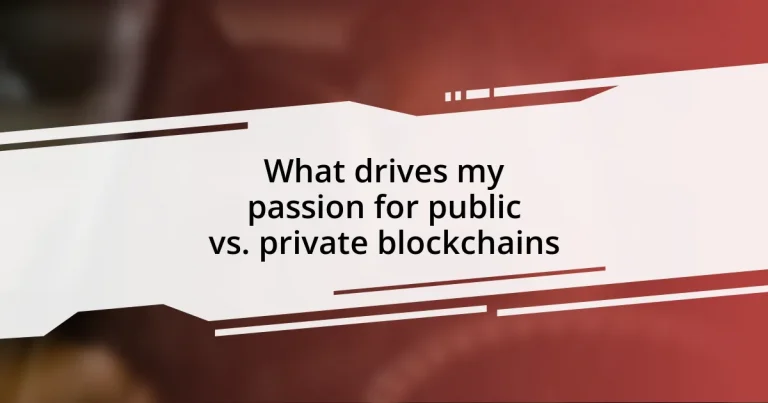Key takeaways:
- Blockchain technology enables secure, transparent transactions without intermediaries, empowering users through decentralized validation.
- Private blockchains enhance data privacy in sectors like healthcare, ensuring sensitive information is accessed only by authorized entities.
- Applications in supply chain management and finance demonstrate blockchain’s potential to improve efficiency and reduce fraud.

Understanding blockchain technology fundamentals
At its core, blockchain technology is about creating a secure and transparent method for recording transactions. This decentralized ledger removes the need for intermediaries, which is where I first felt its potential. When I realized that my friend could send me money without a bank involved, it was like discovering a new world of trust and innovation.
Blockchain operates on a network of computers, known as nodes, that work together to validate transactions. Just think about that for a moment—what does it mean for something to be validated by thousands of independent entities rather than a single authority? It stirs a sense of empowerment, doesn’t it? In my mind, that’s the beauty of blockchain: it democratizes information and gives power back to the people.
Moreover, every block in a blockchain contains a unique hash of the previous block, which ties them together in an unbreakable chain. Have you ever tried pulling apart links in a well-made necklace? Each pendulum has its role in maintaining the integrity of the whole piece. This immutability is what excites me the most—once something is recorded on the blockchain, it’s there forever, resistant to tampering. Isn’t that a comforting thought in our increasingly digital world?

Applications of private blockchain solutions
Private blockchains have found a robust niche in industries requiring confidentiality and data privacy. For instance, organizations in the healthcare sector can use private blockchains to securely share patient records among authorized providers, ensuring compliance with regulations like HIPAA. I can’t help but imagine the peace of mind this brings to patients, knowing their sensitive information is not just locked away, but also accessible only to trusted entities.
Another fascinating application is in supply chain management. Companies can track the provenance of goods while safeguarding proprietary information from competitors. I often think back to a conversation I had with a logistics manager who expressed frustration about transparency issues. With private blockchain solutions, he saw a pathway to not only validate authenticity but also streamline operations. Isn’t it incredible how technology can transform layers of complexity into seamless efficiency?
Financial institutions also leverage private blockchains for secure transactions and smart contract automation. I recall attending a seminar where a blockchain expert highlighted how this innovation reduces fraud and increases transaction speed. It dawned on me that this could revolutionize how banks operate, making financial services more accessible and reliable for everyone. How exciting is it to think about where we might be headed with these advancements?














